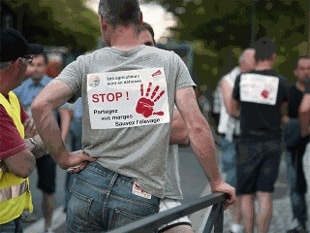
Farmers are a soft target for rural crime, there is an escalating problem with fly-tipping on farmland, rampaging dogs are increasingly leaving a trail of dead and mortally injured ewes and lambs scattered across the countryside, and Scottish farmers and landowners, thanks to Mrs Sturgen, face the reintroduction of Business rate tax for commercial shoots, from 1st April.
Last week Defra secretary Andrea Leadsom yet again had nothing new to tell farmers at the NFU conference, leaving farmers still facing uncertainty.
Other industries would consider they were under siege if they had to face similar daily difficulties, but farmers battle on regardless.
We need to make plans, not just for next season, but years ahead so decisions can be made regarding investment, succession, livestock breeding programmes and cropping.
The mystery is what are we waiting for?
We need leaders driving the agenda, not waiting ‘cap in hand’, for Mrs May and her ministers to decide the future for our industry, the most important in the UK.
We should have people representing us who are prepared to demand what is required. If Mrs Leadsom and NFU president Meurig Raymond are not prepared to lead from the front, and tell the government how to deal with British farming and food production post Brexit, which isn’t rocket science, they should stand aside and leave it to someone who will.
Regrettably few politicians understand the connection between food production, the environment and land management. They do not appreciate or understand that ‘farming’ embraces all three elements. They think they are unrelated, which will be demonstrated when the long awaited Green Paper eventually emerges from the bowls of Defra. I am told, not one but two Green Papers will appear, one on the environment, the other on food production. I sincerely hope that I have been misinformed.
French farmers are facing huge problems which they blame on the EU’s “straitjacket” of regulations and political inaction. French agriculture is now in deep crises, ‘the worst since the Second World War’.
France is currently the biggest beneficiary of EU farm aid, but as reported in The Sunday Telegraph, more than a third of farmers earned less than £3,560 last year. A result of falling food prices and cheaper imports from other member states.
More than 600 French livestock farmers have gone bankrupt, and distressingly on average one farmer committed suicide every two days, according to France’s public health agency.
This crises amongst the agricultural industry is now driving farmers to look favourably towards supporting Marine Le Pen’s anti-EU Front National. They believe that if France leaves the EU things will get better, and they would not be competing with cheap imports of German pork and Spanish fruit, where labour costs are cheaper due to lower taxes and welfare costs, and where they use temporary workers from Eastern Europe on lower wages.
Not all these difficulties can be attributed on ‘globalisation’, nor for that matter can Jeremy Corbyn blame it for the way the public decided to vote in last week’s by-elections. Farming like charity should begin at home. Get that right, which should happen post Brexit, and then we and the French can look beyond the horizon.
The looming hike in business rates at a time when small businesses are already struggling, is indefensible. High streets are already becoming ghost towns, as independent shops and small companies close due to competition from mega stores and internet shopping. So too will some trading from business units in both rural and urban locations.
Instead of raising additional income for councils, the opposite will occur as many businesses will flounder, resulting in higher unemployment, and less taxable income. George Osborne’s ill thought out hike in stamp duty has resulted in the treasury taking £500 million less each year, as the top end of the property market has seized up. Philip Hammond must address this regressive tax in the Budget, and if he and Sajid Javid do not wish to see the Conservatives take a thrashing in the local elections in May, they must listen to the people.

 RSS Feed
RSS Feed